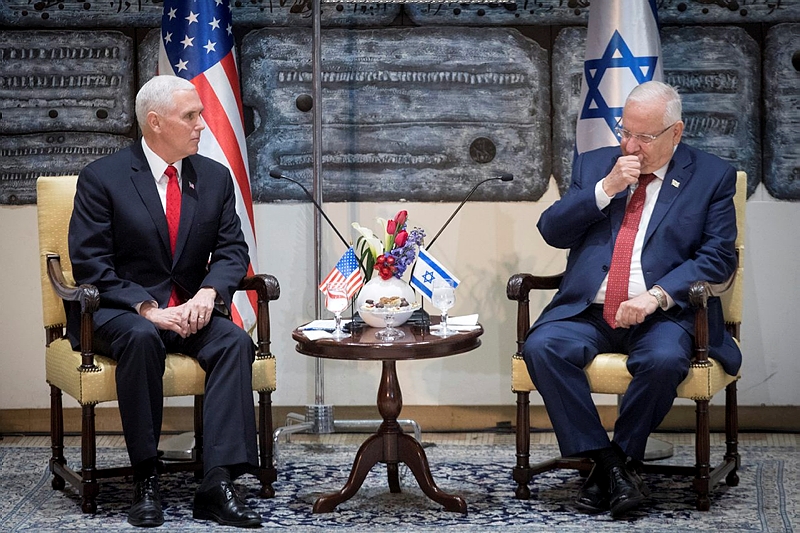The US is planning talks with Britain, France and Germany to enlist European backing to reopen the Iran nuclear agreement and push for changes in the ballistic missile program and “sunset provisions.”
By Steve Leibowitz, World Israel News
The US and Israel have launched a campaign to convince European leaders that the Iranian nuclear agreement must undergo major changes.
US Secretary of State Rex Tillerson said that next week the US will begin holding talks with the governments of Britain, France and Germany on ways to address their joint concerns regarding the international nuclear deal brokered with Iran in 2015. According to Tillerson, the three European nations have already “generally agreed on what flaws in the nuclear accord would have to be addressed. ”
Tillerson indicated that the sunset provisions and the ballistic missile program were the leading concerns.
European governments have indicated that they hope to largely preserve the accord in its current form. But US President Donald Trump is demanding change, or a supplemental US-EU deal tacked onto it that would impose new terms on Iran over its long-term nuclear work. Trump has given European powers a May deadline to engage in a conversation over “fixing” the nuclear accord.
EU foreign policy chief opposes significant changes
While Britain, France and Germany seem willing to take a close look at the nuclear deal with an eye for change, the European Union’s high representative for foreign affairs, Frederica Mogherini, continues to oppose any actions that might infringe on the deal as it currently stands.
European affairs expert and former Italian parliament member Fiamma Nirenstein told World Israel News (WIN) that Europe will cooperate with the US on some aspects of Iranian containment, but not on others. “Cooperate is a big word, but the European nations definitely want to open up the issue of Iranian ballistic missiles because they are within range of attack,” she said.
Regarding the nuclear agreement, Nirenstein does not expect that the European nations will go along with US demands for change. “They would prefer to criticize Iranian aggressive action but not the agreement which they claim has mostly been adhered to,” she surmised.
Nirenstein told WIN that an area where Europe will cooperate with the US “is to press Iran to stop pushing Sunni refugees out of Syria and elsewhere in the Middle East.” According to Nirenstein, Europe is under great pressure from large numbers of immigrants reaching the continent, and European leaders hold Iran to blame.
Pence issues warning from President Rivlin’s residence
Speaking from the Israeli president’s residence, visiting US Vice President Mike Pence on Tuesday urged European leaders to push for change in the Iranian nuclear deal, while threatening that Washington will quit the pact unless there are major changes.
Sitting next to President Reuven Rivlin, Pence told reporters that President Donald Trump will never again sign the waiver against sanctions. “We are sending a signal to our European allies that the time has come for changes in the Iran nuclear deal that will ensure that the ‘sunset provisions’ in the deal are completely eliminated and that punitive sanctions will be available for many years to come, to prevent Iran from obtaining a nuclear weapon,” Pence warned.
The “sunset provisions” would allow Iran to ‘break out’ and quickly build nuclear weapons as soon as the deal expires.
US on ‘right side of history,’ Netanyahu says
During Pence’s visit, Prime Minister Benjamin Netanyahu thanked the US administration for its tough position on Iran, telling the vice president that the US stands on “the right side of history” for rejecting the nuclear deal and supporting the Iranian protesters’ recent demonstrations against the regime.
Netanyahu then lashed out at European leaders for their weak responses to the recent protests across Iran. “I want to salute both President Trump and you, Mr. Vice President, for standing with the people of Iran, when so many in Europe and elsewhere were shamefully silent,” Netanyahu stated.
The prime minister told Pence that Israel agrees with the US administration that the nuclear deal with Iran is “disastrous” and that it paves Tehran’s path to a nuclear arsenal. With a message aimed at European leaders, Netanyahu said, “There is still time for leaders to seize the opportunity that President Trump has offered them, to correct the failings of this failed deal. But if those leaders do not seize that opportunity, or if they offer only cosmetic changes, Israel will unequivocally support the president’s decision to walk away from a bad deal and restore crippling sanctions. Our position is clear: fully fix it, or fully nix it,” he said.


